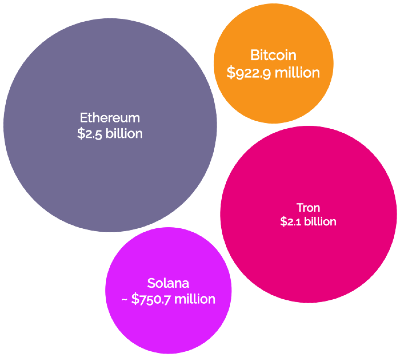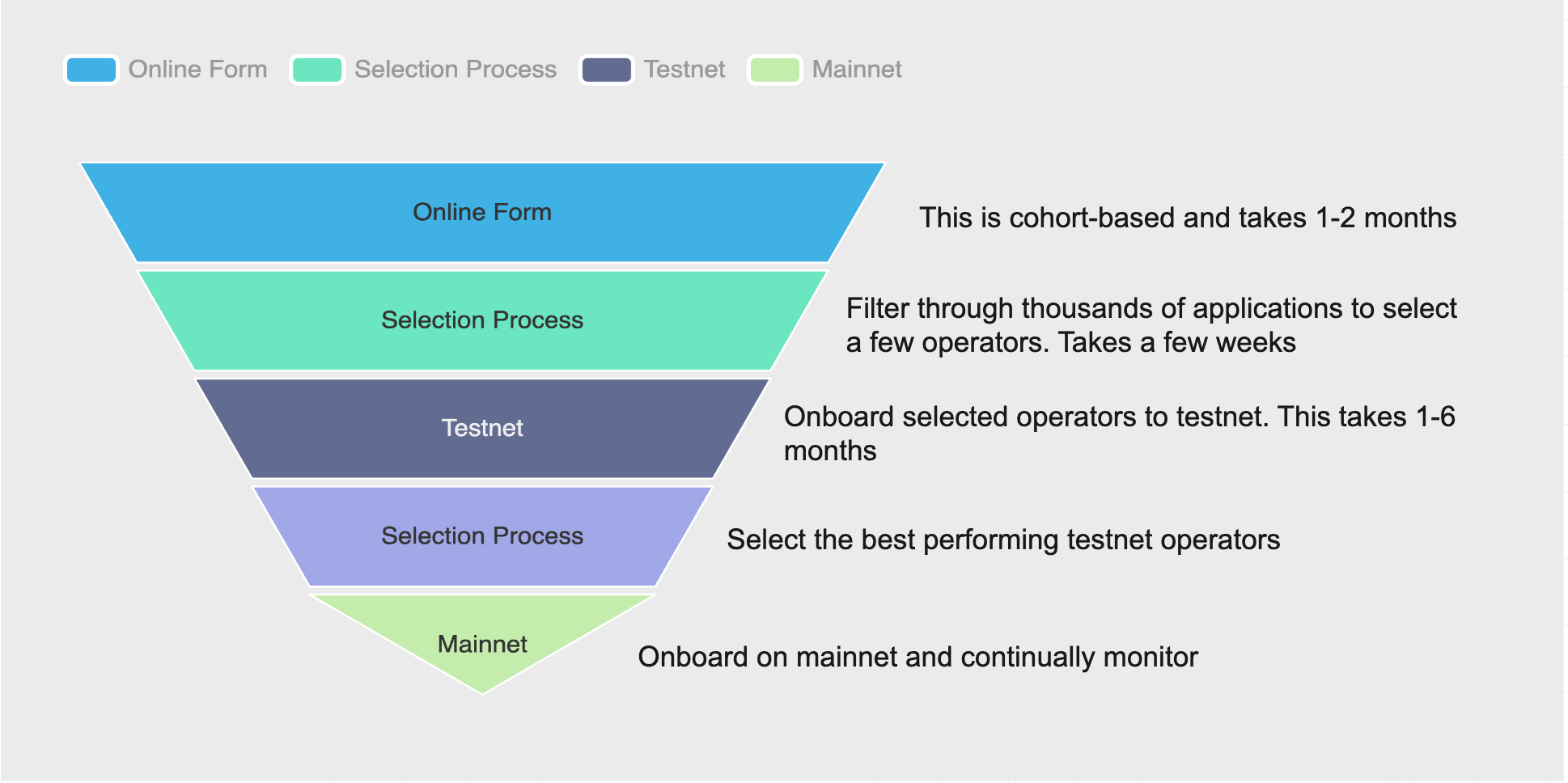From Blocks to Billions: The Rise of the Operator Economy
The operator economy is the backbone of the on-chain economy. Every decentralised protocol that exists today requires operators.

What is the Operator Economy?
Operator Economy is a digital ecosystem where people earn rewards currently > $5 billion a year for running, securing, and scaling the core services (e.g., validation, storage, compute, data feeds, financial services) that keep decentralised networks like Bitcoin and Ethereum running.
Decentralised networks are only as strong as the entities running the protocol, as users engage with these protocols through their operators.
If you run a reliable infrastructure, the protocol pays you.

Decentralised networks create value by facilitating economic transactions without a need for centralized intermediaries. The operator economy converts social & technical ability into new forms of wealth.
Who is an Operator?
Operators run the infrastructure that powers the on-chain economy; without them, Web3 wouldn't exist

In 2024, validators (staking operators) earned >$2.5 B on Ethereum and >$700 M on Solana for keeping the networks secure. Aave DAO paid $2m to Chaos Labs in 2024 for risk management services, and Uniswap paid approximately $900m to LPs in 2024.
What makes a great operator? A great operator has these three main characteristics:
- Reliable: An operator must ensure that their infrastructure performs its intended function with a 99.999% uptime.
- Secure: The capability of an operator to manage sensitive key materials from physical and cyber threats with Bank-vault level security processes.
- High Availability: 24/7 fail-over ready, resilience to failures, and a fast recovery infrastructure setup are essential. As crypto doesn't sleep, there is a requirement for an operator to be available 24/7, 365 days a year.
Operator Economy Market Map & Revenue

Maximizing labor and capital to earn the highest possible return remains the most significant concern of operators today.
Currently, decentralized protocol rewards are the primary means by which most operators earn money. This ecosystem is valued at more than $5 billion.
Some operators also have additional side businesses, such as centralized RPC services, data analysis, and other offerings that generate extra revenue. Examples include Coinbase and Binance, which are Cryptocurrency exchanges and operators in various decentralized networks.
What the Operator Economy offers
Key attractors to the Operator Economy include:
Independence: Freedom to provide service infrastructure without the need for traditional gatekeepers or intermediaries.
Monetization: Make an income from the rewards issued and fees earned by decentralized protocols.
New career paths: the emergence of new career paths where anyone can make a living from their social and technical capability.
Innovation: You contribute to the development of credibly neutral infrastructure that provides access to everyone everywhere.
Stakeholders in the Operator Economy
Operators: They provide the infrastructure for decentralized protocols, enabling users to access global decentralized services.
Networks: These are decentralized protocols, such as Bitcoin and Ethereum, that run on globally distributed computers.
Users: Services provided in the operator economy are consumed by people interested in accessing and conducting economic transactions on a credibly neutral infrastructure.
Operator Tools and Services: Multiple tools and services are available in the operator economy to increase ROI and ensure high operator performance and security. Examples include Flashbots MEV infra, which enables operators to receive MEV blocks, and Obol, which offers distributed validator technology infrastructure.
Investors and VCs: Entities willing to contribute financially to the development of the operator economy.
Academic and Research Institutions: Explore the impact of the operator economy on society.
Common Roles within the Operator Economy
Operator as a Staking Service Provider
Liquid staking providers act as aggregators for Validators (staking operators) to obtain a stake and participate in consensus for Proof-of-Stake networks. Multiple liquid staking protocols, like Lido and EtherFi, aggregate stakes and operators and ensure that Validators adhere to a service level agreement.
Operator as a DeFi Curator/DeFi Risk Manager
Entities like Chaos Labs and Gauntlet manage risk on lending protocols. They provide active risk management services to several decentralised financial protocols.
Operator as a Storage Provider
Decentralized storage services, such as Filecoin and Akash, require node operators to store large amounts of data. Operators in this ecosystem offer ample disk space to store data published by their consumers.
Operator as an AI Infrastructure Provider
AI services require TEE environments to operate and manage sensitive key materials. Operators with TEE infrastructure provide services for decentralized AI protocols.
Operator as Decentralised RPC Provider
Protocols like Pokt Network enable consumers to interact relatively cheaply with RPC for public networks, such as Ethereum and Solana, compared to centralized providers by leveraging distributed operators.
Operator as a Block Builder
Block building is relatively centralized due to the requirements of running beefy, low-latency nodes. Some specialized operators possess the capital and technical capabilities to operate the necessary infrastructure.
Operator as an Intent Solver
Intent protocols expand the accessibility of the decentralized protocols to include declarative requests. Operators interpret and execute the intent according to the user's requirements. An example is CowSwap, which enables users to trade tokens in an MEV-safe environment.
Operator as a Compute Provider
Various operators run CPU and GPU clusters and offer access to these clusters via decentralized protocols to entities worldwide that require extra compute power.
Many ZK and AI workloads require a decent amount of CPU & GPU resources. Compute Networks provides these resources at a low cost and potentially at scale.
Operator as an Oracle Provider
Price feed oracles power decentralised finance. Operators in each oracle ecosystem provide real-world information that is aggregated for on-chain use cases (e.g., lending). Chainlink is a major provider of price information of asset information across chains. Chainlink has secured approximately $19 trillion worth of transaction value.
Enterprises are already tapping into the Operator Economy
Multiple enterprises are leveraging the services provided by operators in the operator economy. Companies like Stripe offer stablecoin payments using decentralized networks, such as Ethereum and Solana, which decentralized operators power.
Multiple startups are utilizing blockchains like Ethereum and Solana to offer instant, global access to US T-bills, which was previously impossible.
Protocols like Helium are leveraging decentralised operators to provide cheap global internet and mobile telephony access.
Driving the growth of the Operator Economy
The growth of the Operator Economy underscores the need for a neutral infrastructure layer in an increasingly politically polarized world.
Various governments currently use finance and technology as political weapons. As more credibly neutral protocols launch, the demand for specialized operators to run the infrastructure increases.
The challenge of working with a large number of operators

We've established that Operators are a critical component for decentralisation.
Today, 12 companies control a majority of Proof-of-Stake networks, which isn't the goal for decentralisation.
Operators are discovered, onboarded, and managed independently by each decentralized network and subsequently motivated mainly by high-inflationary token rewards, which have typically led to several adverse incentives.
However, inflation rewards are being proposed to be cut across the industry, for example, Solana SIMD-228 and Ethereum MVI. There is a belief that we are at peak staking yield.
Operator Discovery
A typical operator discovery process involves sharing a Google form on Twitter, hoping that enough operators will see it and be interested in it. Protocols must sift through thousands of online applicants, which is a time-consuming and labor-intensive process.
On average, an operator discovery process is cohort-based and requires 1-3 months of active manual effort, along with several hours of calls per day.
Currently, there is no way to discover new operators in the ecosystem. The operator discovery process is a manual, labor-intensive, and capital-intensive process.
Operator Onboarding
Currently, ensuring an operator meets all requirements to onboard to a network is a 3- to 6-month manual process, from discovery to onboarding on Mainnet.
This is quite a stressful and time-consuming process for all parties involved in the onboarding process.
Operator Management
Ensuring an operator continuously adheres to a protocol's requirements is a manual and repetitive process. It requires multiple teams to collaborate, and things are often lost in the process.
Most of the time, there is confusion about who is responsible for ensuring that operators adhere to the required standards.
Operator management is currently very manual and expensive. For example, Lido protocol spends around $1-$2 million annually on managing ~500 operators.
Operator Incentivisation
The current state-of-the-art approach to incentivising protocol operators is via high token inflation rewards. This has been proven not to be highly beneficial to both networks and operators, as it leads to adverse secondary effects.
This will change significantly as several protocols explore a modular approach to incentivizing operators. e.g. Celestia PoG
Conclusion
The operator economy is the backbone of the on-chain economy. Every decentralised protocol that exists today requires operators.
The growth of decentralized protocols and the Operator Economy is intertwined. As decentralized protocols become more prominent, more operators are drawn to the opportunities available and the potential financial rewards.
It's also attractive to large companies and startups because it offers a lower barrier to entry and easy global access to resources.
Pagrin is developing a solution to address the issues we've identified in the challenges of working with operators.
